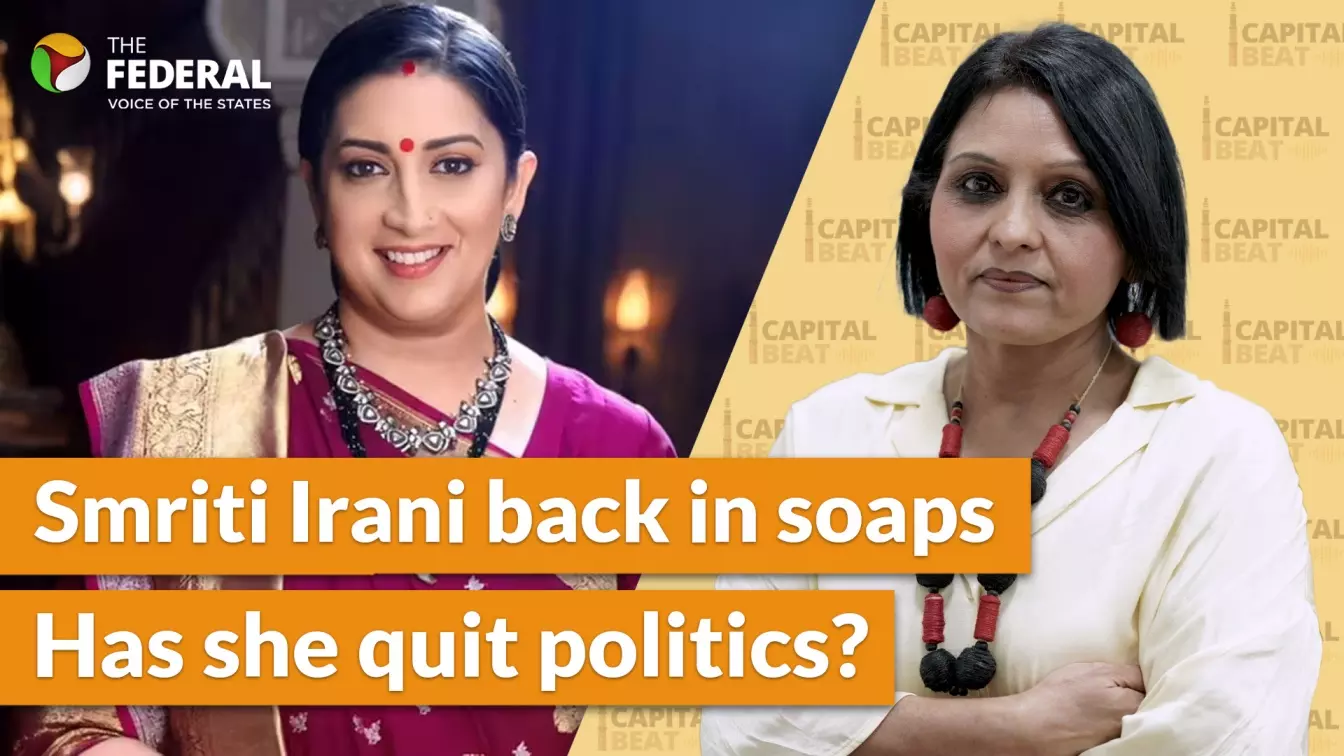
The panel members agreed that her future depends not just on TRPs or past mistakes but on how India’s political winds blow.
Smriti Irani's return to acting - retreat from politics or recalibration?
Smriti Irani's leaked look as Tulsi in 'Kyunki Saas Bhi Kabhi Bahu Thi' reboot fuels political and pop culture buzz

In this episode of Capital Beat, senior journalist Neelu Vyas discusses Smriti Irani’s much-anticipated return to television with an expert panel comprising journalist Sunita Aron, political analyst Vivek Deshpande, and women’s rights activist Tahira Hasan. The conversation navigates Irani’s shifting public roles - from soap icon to politician and now back - and what it means for her political future and representation of women in Indian politics.
'Recalibration, not retreat'
Sunita Aron rejected the notion that Irani’s return to acting signals failure in politics.
“Just because she lost in 2024 doesn’t mean her political career is over,” she said.
She emphasised that Irani had always been more powerful than popular, and returning to the screen might simply be a recalibration, not a retreat.
Also Read: Smriti Irani returns as Tulsi in Kyunki Saas Bhi Kabhi Bahu Thi Season 2
Aron also noted that Irani’s role was iconic in Kyunki Saas Bhi Kabhi Bahu Thi, recalling how both men and women in newsroom settings used to gather around the TV when it aired.
“She commanded attention on the screen in ways few actors - let alone politicians - do,” Aron said.
A fall from favour?
Vivek Deshpande, however, pointed to Irani’s fading visibility after her electoral defeat.
“She used to be one of the BJP’s most prominent voices in and outside Parliament,” he said. “Post-loss, she has been pushed into irrelevance.”
Deshpande explained that Irani, once seen as aggressive and articulate, didn’t fit the traditional mould of parliamentary decorum.
Also Read: Smriti Irani embarks on four-nation tour to promote book on PM Modi
“Still, by BJP’s current standards, she was performing the role perfectly,” he remarked, comparing her to Nishikant Dubey in terms of style.
But Deshpande speculated that either the party sidelined her or she opted out due to frustration.
“Whether BJP abandoned her or she walked away is unclear - but her re-entry into television suggests she's been politically orphaned,” said Deshpande.
'Betrayed cause of women'
Women’s rights activist Tahira Hasan was scathing.
“She betrayed the cause of women,” Hasan argued, criticising Irani’s silence during critical moments such as the wrestler protests and her opposition to paid menstrual leave.
Also Read: Smriti Irani to Annamalai: Voters show these 'hate speech makers' the door
“She never connected with the grassroots struggles of ordinary women - be it factory workers or domestic help,” said Hasan.
While she acknowledged Irani’s popularity as Tulsi Virani, she asserted, “As Women and Child Development Minister, she failed.”
Double standards
Neelu Vyas raised a pointed question: Are we judging Irani more harshly because she is a woman?
“When men like Nishikant Dubey indulge in theatrics, they aren’t discredited as failed politicians,” she said.
Also Read: From Smriti Irani to Rajeev Chandrasekhar, Union ministers who lost 2024 elections
Aron responded, “There’s no denying the fact that Irani was a powerful speaker. But when it came to raising women’s issues, she was missing.”
Vyas acknowledged Irani’s failure on that front but questioned whether she deserves complete erasure from the political discourse.
Strategic reinvention?
Could Irani be using television as a tactical platform to regain popularity? Hasan and Deshpande agreed this might be a strategic pause.
“She might ride a wave of TV popularity back into politics,” Hasan said.
Deshpande added, “She reportedly lobbied for a Rajya Sabha seat and was denied. Her return to acting might reflect frustration - but don’t write her off. A BJP leadership change by 2029 could bring her back.”
Gender bias in politics?
Vyas ended the debate with a broader critique.
“Are political parties using women like tissue paper - use and discard?” she asked.
Aron responded, “Women across parties get token roles. Even in the Congress, representation has been poor.”
Hasan pointed out that unlike Mamata Banerjee or Mayawati, Irani never raised real issues.
Also Read: Big names who lost LS polls: Smriti Irani, Maneka Gandhi, Adhir Ranjan, Annamalai
“Symbolism without substance is empty,” said Tahira Hasan.
The panel was divided - between seeing Irani’s comeback as failure or foresight. But all agreed that her future depends not just on TRPs or past mistakes but on how India’s political winds blow. As Sunita Aron noted, “The wall between TV and politics no longer exists.”
The last word might yet belong to the audience, not just the electorate.
(The content above has been generated using a fine-tuned AI model. To ensure accuracy, quality, and editorial integrity, we employ a Human-In-The-Loop (HITL) process. While AI assists in creating the initial draft, our experienced editorial team carefully reviews, edits, and refines the content before publication. At The Federal, we combine the efficiency of AI with the expertise of human editors to deliver reliable and insightful journalism.)

